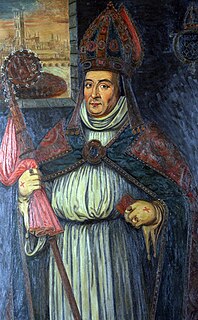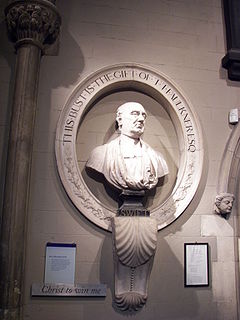Related Research Articles

John Morton was an English prelate who served as Archbishop of Canterbury from 1486 until his death and also Lord Chancellor of England from 1487. He was elevated to the cardinalate in 1493.

Thomas Rotherham, also known as Thomas (Scot) de Rotherham, was an English cleric and statesman. He served as bishop of several dioceses, most notably as Archbishop of York and, on two occasions as Lord Chancellor. He is considered a venerable figure in Rotherham, South Yorkshire, his town of birth.
Sir Robert Brackenbury was an English courtier, who was Constable of the Tower of London during the reign of Richard III. He is believed to have been responsible for enabling the (presumed) murders of the Princes in the Tower, though there is no conclusive evidence to prove it. He died defending the King at the Battle of Bosworth Field in 1485.

Henry Chichele was Archbishop of Canterbury (1414–1443) and founded All Souls College, Oxford.

William Waynflete, born William Patten, was Provost of Eton (1442–1447), Bishop of Winchester (1447–1486) and Lord Chancellor of England (1456–1460). He is best remembered as the founder of Magdalen College and Magdalen College School in Oxford.

The Dean of St. Patrick's Cathedral is the senior cleric of St Patrick's Cathedral, Dublin, elected by the chapter of the cathedral. The office was created in 1219 or 1220, by one of several charters granted to the cathedral by Archbishop Henry de Loundres between 1218 and 1220.

John Montagu or Mountague was an English churchman and academic.
Robert Blackadder was a medieval Scottish cleric, diplomat and politician, who was abbot of Melrose, bishop-elect of Aberdeen and bishop of Glasgow; when the last was elevated to archiepiscopal status in 1492, he became the first ever archbishop of Glasgow. Archbishop Robert Blackadder died on 28 July 1508, while en route to Jerusalem on pilgrimage.

Walter Devereux, 8th Baron Ferrers of Chartleyjure uxoris was an English nobleman and a loyal supporter of the House of York during the Wars of the Roses. He was a member of the inner circle of King Edward IV, and died fighting for Edward's younger brother, King Richard III, at the Battle of Bosworth in 1485.
John Russell was an English Bishop of Rochester and bishop of Lincoln and Lord Chancellor.
William Ayermin was a medieval Bishop of Norwich.

Robert Morton was an English priest and Bishop of Worcester.
William Hamilton was deputy chancellor of England from 1286 to 1289, then Lord Chancellor from 1305 to his death on 20 April 1307. He was also Dean of York.
John Devereux, 9th Baron Ferrers of Chartley was an English peer.
Walter de Coventre was a 14th-century Scottish ecclesiastic. There is no direct evidence of his birthdate, his family, or his family's origin, although he may have come from the region around Abernethy, where a family with the name de Coventre is known to have lived. Walter appeared in the records for the first time in the 1330s, as a student at the University of Paris. From there he went on to the University of Orléans, initially as a student before becoming a lecturer there. He studied the arts, civil law and canon law, and was awarded many university degrees, including two doctorates. His studies were paid for, at least partially, by his benefices in Scotland. Despite holding perhaps more than five benefices at one stage, he did not return to Scotland until the late 1350s.

Richard Love (1596–1661) was an English churchman and academic, Master of Corpus Christi College, Cambridge, Lady Margaret's Professor of Divinity, member of the Westminster Assembly, and Dean of Ely.
Anthony Belasyse, also Bellasis, Bellows and Bellowsesse was an English churchman and jurist, archdeacon of Colchester from 1543.
John de St Paul, also known as John de Owston and John de Ouston, was an English-born cleric and judge of the fourteenth century. He was Archbishop of Dublin 1349–62 and Lord Chancellor of Ireland 1350–56. He had previously been Master of the Rolls in England 1337–40. Apart from a brief period of disgrace in 1340, he enjoyed the confidence of King Edward III. He was described as a zealous supporter of English rule in Ireland, but also as a pragmatic statesman who was willing to conciliate the Anglo-Irish ruling class. He did much to enlarge and beautify Christ Church, Dublin, although virtually no trace of his improvements survive, having been destroyed by the Victorian rebuilding of the Cathedral.
William Cosyn was priest, a JP for Somerset from 1506–1516, and Dean of Wells Cathedral from 1498–1525.
Clonmethan is a townland and a civil parish in the ancient barony of Balrothery West, Fingal in Ireland. It is bordered by the parishes of Palmerstown to the west, Grallagh to the north, Hollywood to the northeast, Westpalstown to the east, Killossery to the southeast, Killsallaghan to the south, and Greenoge, County Meath to the southwest.
References
- 1 2
 One or more of the preceding sentences incorporates text from a publication now in the public domain : "Barowe, Thomas". Dictionary of National Biography . London: Smith, Elder & Co. 1885–1900.
One or more of the preceding sentences incorporates text from a publication now in the public domain : "Barowe, Thomas". Dictionary of National Biography . London: Smith, Elder & Co. 1885–1900.